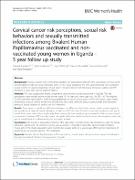| dc.contributor.author | Kumakech, Edward | |
| dc.contributor.author | Andersson, Sören | |
| dc.contributor.author | Wabinga, Henry | |
| dc.contributor.author | Musubika, Caroline | |
| dc.contributor.author | Kirimunda, Samuel | |
| dc.contributor.author | Berggren, Vanja | |
| dc.date.accessioned | 2020-11-10T09:34:53Z | |
| dc.date.available | 2020-11-10T09:34:53Z | |
| dc.date.issued | 2017 | |
| dc.identifier.citation | Kumakech, E., Andersson, S., Wabinga, H., Musubika, C., Kirimunda, S., & Berggren, V. (2017). Cervical cancer risk perceptions, sexual risk behaviors and sexually transmitted infections among Bivalent Human Papillomavirus vaccinated and non-vaccinated young women in Uganda-5 year follow up study. BMC women's health, 17(1), 40. | en_US |
| dc.identifier.uri | https://hdl.handle.net/123456789/183 | |
| dc.description.abstract | Background: Previous studies were conflicting regarding the associations between HPV vaccination, cervical cancer
risk perceptions, high-risk sexual behaviors and STIs. This study compared the HPV-vaccinated and non-vaccinated
young women in Uganda regarding cervical cancer risk perceptions, high-risk sexual behaviors, syphilis and HIV
infections 5 years after vaccine implementation.
Methods: This was a population-based comparative cross-sectional survey conducted in Uganda. The 438
participants were sexually active young women aged 15–24 years and mean age was 18.6 (SD 1.4). The majority
(53.0%) were HPV-vaccinated in 2008 without assessment of sexual activity prior to HPV vaccination. Upon verbal
assessment of sexual activity at the time of follow-up, data were collected using a questionnaire and laboratory
testing of blood samples for syphilis and HIV infections.
Results: There were no significant differences between the HPV-vaccinated and non-vaccinated groups regarding
the prevalence of high-risk sexual behaviors, syphilis and HIV infections. Cervical cancer risk perceptions and age at
sexual debut were nonetheless significantly lower among the vaccinated group compared to their non-vaccinated
counterparts. However, HPV vaccination was not significantly associated to cervical cancer risk perceptions and early
age at sexual debut in multivariate logistic regression analysis.
Conclusions: We found no associations between HPV vaccination, cervical cancer risk perceptions, high-risk sexual
behaviors, syphilis and HIV infections among young women in Uganda 5 years after vaccine implementation.
Young girls in the study population were found to be sexually active at a young age, affirming the importance of
targeting girls of younger age for HPV vaccination. | en_US |
| dc.language.iso | en | en_US |
| dc.publisher | BMC women's health | en_US |
| dc.subject | Bivalent Human Papillomavirus (HPV) vaccination | en_US |
| dc.subject | cervical cancer risk perceptions | en_US |
| dc.subject | sexual risk behaviors | en_US |
| dc.subject | Sexually transmitted infections | en_US |
| dc.subject | Young women | en_US |
| dc.subject | Uganda | en_US |
| dc.title | Cervical cancer risk perceptions, sexual risk behaviors and sexually transmitted infections among Bivalent Human Papillomavirus vaccinated and nonvaccinated young women in Uganda - 5 year follow up study | en_US |
| dc.type | Article | en_US |

